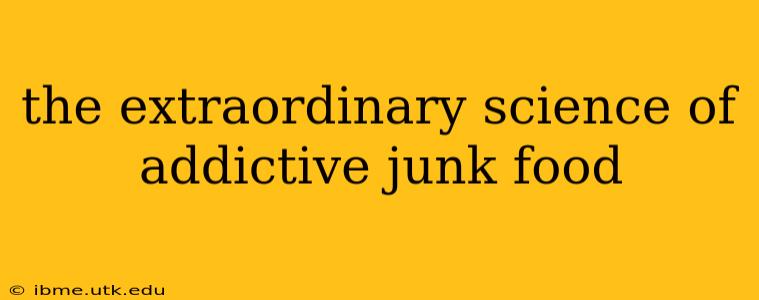The irresistible allure of junk food is no accident. Decades of scientific research reveal a sophisticated interplay of ingredients, processing techniques, and marketing strategies designed to trigger our brain's reward system, leading to compulsive consumption. Understanding the science behind addictive junk food is crucial to making informed choices about our diet and overall health. This exploration delves into the extraordinary science behind why we crave those salty, sugary, and fatty treats.
What makes junk food so addictive?
The addictive nature of junk food isn't simply about taste; it's a complex interplay of several factors. Highly processed foods often contain a potent combination of sugar, fat, and salt, ingredients that stimulate the brain's reward pathways, releasing dopamine—a neurotransmitter associated with pleasure and reward. This creates a positive feedback loop: the more we consume these foods, the more we crave them. The highly palatable nature of these foods—think of the satisfying crunch of chips or the creamy texture of ice cream—further reinforces this cycle.
How does junk food affect the brain?
Junk food's impact on the brain is far-reaching. The high levels of sugar and refined carbohydrates lead to rapid spikes and crashes in blood sugar levels, resulting in energy fluctuations and cravings. This rollercoaster effect can disrupt the brain's natural reward system, making it more sensitive to highly palatable foods and less responsive to natural rewards like social interaction or exercise. Furthermore, some studies suggest that certain food additives, like emulsifiers, may alter gut microbiota, influencing brain function and potentially increasing susceptibility to addictive behaviors.
Is junk food truly addictive?
The debate surrounding the addictiveness of junk food continues. While it might not fit the strict criteria of substance addiction, many researchers argue that junk food shares several characteristics with addictive substances. These characteristics include compulsive consumption despite negative consequences (weight gain, health problems), withdrawal symptoms (irritability, cravings), and a loss of control over consumption. This is supported by neuroimaging studies showing that junk food activates the brain regions involved in addiction in a similar way to drugs of abuse. The crucial point is the degree of consumption and the resultant negative health impacts. Moderate consumption versus habitual, compulsive over-consumption paints a drastically different picture.
What are the long-term effects of eating junk food?
The long-term consequences of excessive junk food consumption are well-documented. It contributes significantly to obesity, type 2 diabetes, heart disease, and certain cancers. The chronic inflammation associated with a diet high in processed foods can also damage various organ systems. Moreover, the addictive nature of junk food can lead to a vicious cycle of weight gain, negative self-image, and further compulsive eating. This highlights the importance of mindful eating and making conscious choices about the food we consume.
How can I reduce my junk food cravings?
Overcoming junk food cravings requires a multifaceted approach. Gradually reducing your intake, increasing your consumption of whole, unprocessed foods, and staying well-hydrated can help. Regular exercise plays a significant role in regulating blood sugar levels and reducing stress, which can trigger cravings. Mindfulness practices, like paying attention to your hunger cues and eating slowly, can also enhance your awareness of your eating habits and help you make healthier choices. Seeking support from a registered dietitian or therapist specializing in eating disorders can provide personalized guidance and support.
What role does marketing play in junk food addiction?
The aggressive marketing of junk food, particularly targeting children and adolescents, is a significant factor contributing to its widespread consumption. Advertisements often employ sophisticated techniques to create appealing images and associations, triggering emotional responses that bypass rational decision-making. The ubiquity of junk food in convenient locations—schools, supermarkets, and even gas stations—further reinforces its accessibility and availability. This strategic marketing plays a substantial role in shaping our food preferences and consumption habits.
Can junk food be part of a balanced diet?
While entirely eliminating junk food might be unrealistic for some, moderation is key. Occasional indulgence shouldn't negate the overall healthfulness of a balanced diet. The emphasis should always be on predominantly consuming whole, unprocessed foods and making informed choices based on nutrition and health. The key is mindful consumption, being aware of portion sizes, and understanding the impact of these foods on your body and brain.
This exploration of the extraordinary science of addictive junk food reveals a complex picture, highlighting the interplay of biological, psychological, and environmental factors. Understanding these factors is the first step towards making informed decisions about our diet and fostering healthier eating habits. By focusing on a balanced approach and prioritizing whole, unprocessed foods, we can mitigate the risks associated with excessive junk food consumption and promote overall well-being.
